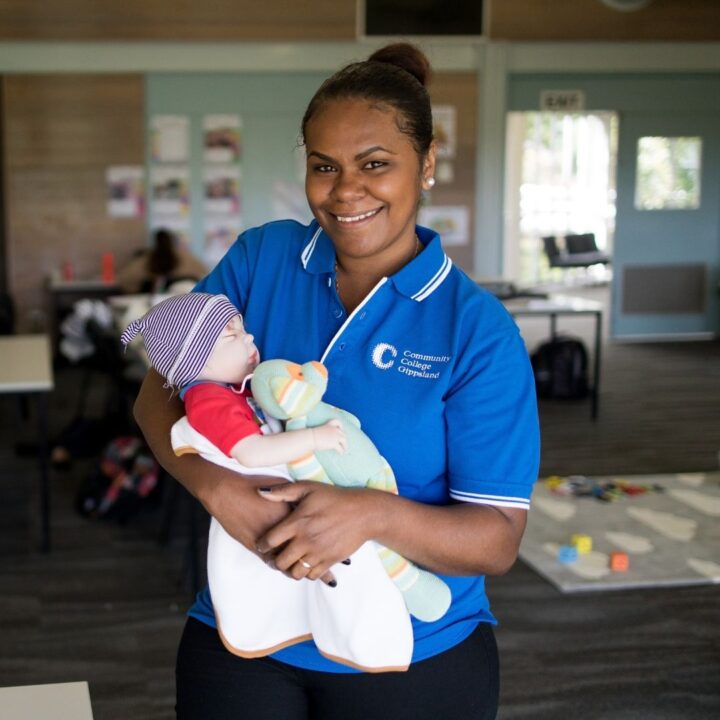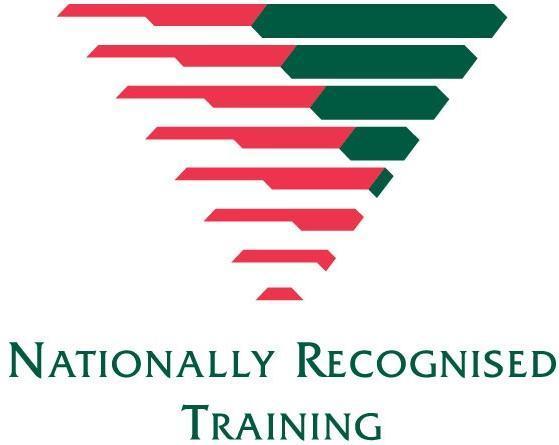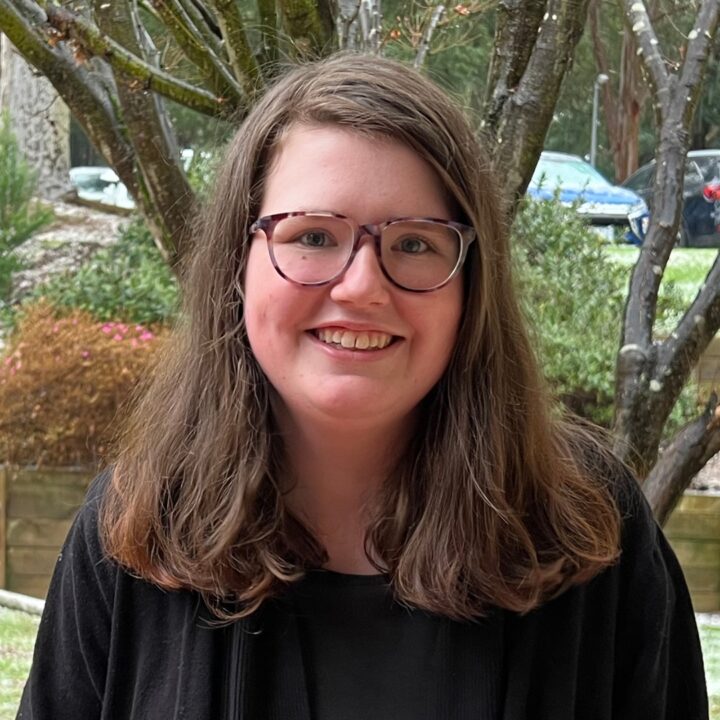Certificate III in Early Childhood Education and Care CHC30121
In Classroom

Early childhood is a growing and professional career that ensures babies and children get their best start in life and learning. At CCG, you can start your career in early childhood with confidence!
Experienced professional educators will build your skills and knowledge of education and care in the early childhood industry. You will complete 160 hours of work placement to gain hands-on skills and enhance your career and employment opportunities.


Emily Matthews
For Emily Matthews, school was not always a positive place. “I was a student in a regional area, struggling to learn with a visual processing disorder and there wasn’t a lot of support,” Emily said. “When I left school in year 11, I struggled with literacy, especially spelling. It made me feel trapped, and worried […]
Sarah
“I thought about it for a while, then decided to work in early childhood, mostly because of the family-friendly hours,’ she says. ‘As a single mum with three kids, I knew I’d have to keep earning money as well as studying and looking after my family, and that it would be a challenge juggling it all while doing the course. But I also knew it was the right time to take the plunge.”
A blend of classroom-based learning and industry work placement. Students attend classes two days per week for 38 weeks and complete work placement. Work placement days vary depending on the individual circumstances and workplaces. Some parts of classroom-based learning may be available to learn online.
Classroom-based training at the Warragul campus. We expect four hours per week of study outside the scheduled training time. You can join an additional study day with a trainer by appointment.
To complete this course, you must work at least 160 hours in a regulated education and care service. We recommend you work in a variety of settings incorporating a range of shifts.
You must work at least:
- 20 hours in a babies’ room (0-1-year-olds)
- 20 hours with kinder age children.
Industry work placement starts after the successful completion of the first three units. Before starting placement, you need:
- a current Working with Children
- a Police check
The full qualification is 17 units of competence: 15 core units and two elective units.
Core units:
- CHCECE030 Support inclusion and diversity C
- HCECE031 Support children’s health, safety and wellbeing
- CHCECE032 Nurture babies and toddlers
- CHCECE033 Develop positive and respectful relationships with children
- CHCECE034 Use an approved learning framework to guide practice
- CHCECE035 Support the holistic learning and development of children
- CHCECE036 Provide experiences to support children’s play and learning
- CHCECE037 Support children to connect with the natural environment
- CHCECE038 Observe children to inform practice
- CHCECE054 Encourage understanding of Aboriginal and/or Torres Strait Islander peoples’ cultures
- CHCECE055 Meet legal and ethical obligations in children’s education and care
- CHCECE056 Work effectively in children’s education and care
- CHCPRT001 Identify and respond to children and young people at risk
- HLTAID012 Provide First Aid in an education and care setting
- HLTWHS001 Participate in workplace health and safety
Electives units:
- CHCDIV001 Work with diverse people
- HLTFSE001 Follow basic food safety practices
Total hours 1108
CCG requirements:
- 17 years or older
- Hold a minimum of Year 10 or equivalent
- Good computer application skills
- Attend a pre-enrolment interview. At the interview (1 hour approx.) you will:
- Discuss course requirements and your suitability
- Discuss your general work, learning experiences and, your career and employment pathways
- Complete an online skills review so we can understand your literacy and numeracy levels and discuss the level of study that would be best for you
- Check your eligibility for a Skills First Government-funded place
- Be given a quote for course fees
Qualification entry requirements: Nil
Licensing requirements: All Early Childhood service providers must comply with Education & Care Services National Law Act 2011.
The total course fees listed below are approximate and based on:
- the total unit of competency hours at enrolment for the calendar year (January to December),plus materials and amenity fees
- completion of the full course within 12 months.
Fees for unit enrolments started in 2025 are subject to change.
Skills first full fee
- Tuition fee (teaching and training) $2.50 per contact hour
- Course tuition fee $2,770.00
- Materials fee (resources) $152.95
- Amenities fees $110.80
- Total course fee $3,033.75
Skills first concession fee
- Tuition fee (teaching and training) 50c per contact hour
- Course tuition fee $554.00
- Material fee (resources) $152.95
- Amenities fee $110.80
- Total course fee $817.95
Fee for service
- Tuition fee (teaching and training) $10.00 per student contact hour
- Course tuition fee $11,080.00
- Material fee (resources) $152.95
- Amenities fee $110.80
- Total course fees $11,343.75
The tuition fees as published are subject to change given the individual circumstances at the time of enrolment. At the pre-enrolment interview we will give you a Statement of Fees Course Quote for the proposed course of study.
This qualification provides Nationally Recognised Training and is delivered with Victorian and Commonwealth Government funding. People with a disability are encouraged to apply.
The Skills First Government contribution to this course is approx. $7.50 per student contact hour.
You may be eligible to receive Government funding to support the course fees. If you have a current concession card and are eligible for a funded place, we will charge a smaller fee. CCG can provide students with a payment plan to help pay fees. Refer to the Skills First Eligibility Checklist below to check your eligibility for a government-funded place. Eligibility will be checked at the pre-enrolment interview. If you think you might be eligible; bring supporting documents to the interview.
We will guide you through the process to check your eligibility at the pre-enrolment interview.
Skills First funded place eligibility criteria
Citizenship/Residency
You must live permanently in Victoria and be:
- An Australian citizen; or
- A holder of a permanent resident visa; or
- A New Zealand citizen
You must present one of the following proof of Australian Citizenship/Residency:
- Australian or New Zealand birth certificate (not extract)
- Australian or New Zealand citizenship certificate Current Australian or New Zealand passport
- Current green Medicare Card
- Proxy declaration for individuals in exceptional circumstances (clarification during interview)
- Australian Certificate of Registration by Descent
- Formal confirmation from the Visa Entitlement Verification Online System (VEVO) of permanent residence granted by the Department of Home Affairs (or its successor) AND the student’s foreign passport or ImmiCard. If applicable, a document from the Department of Home Affairs confirming that the student holds a bridging visa.
- A Referral to Government Subsidised Training – Asylum Seekers’ form from the Asylum Seeker Resource Centre or the Australian Red Cross
Limits on the amount of training that can be subsidised A Skills First Student can only:
- Begin a maximum of two Skills First subsidised skill sets or two Skills First subsidised AQF qualifications in a calendar year. If a student is enrolled in a program(s) that is scheduled to start later in that calendar year, this program(s) must be counted for the purpose of this limit
- Study a maximum of two Skills First subsidised programs at any one time (the ‘2 at a time’ limit)
Eligibility exemptions may apply and can be discussed at the pre-enrolment interview.
- A polo shirt with CCG logo for use on work placement
- The Early Childhood Educator for Certificate III by Lorraine Walker, 3rd edition
- First Aid online login, booklet and everyday learning kit
- Pen and paper
- Access to a computer and the Internet
At the time of enrolment and before the course or training starts one of the following payment options must be made. Payment confirms the student’s place in the course.
- Pay all course fees at enrolment
- Commit to a payment plan via direct debit arrangement with EZYPAY
Please note:- Material fees cannot be included in the direct debit and must be paid for in full at enrolment.
- A minimum deposit of 10% of the course tuition fees for the units selected for the calendar year.
- Payments can be made fortnightly, or monthly.
Request a payment plan if you require support to pay your course fees.
If you withdraw from your course by written notice within 4 weeks of the date you completed your enrolment/payment process and up to within 4 weeks of the course commencement date (using the Course Withdrawal form) you will receive a refund on your tuition fee, minus a $50.00 administration fee. A refund of any materials purchased from CCG will be dependent on the condition of the unused materials and is determined by the Training Manager. The form must be submitted to the Customer Service Officer at any CCG campus location or to the Training Manager. You are not entitled to any refund if you withdraw after the four week period. If a course is cancelled by CCG at any time during the period of a person’s enrolment, CCG will refund the pro-rata portion of the tuition fees, amenity fees, and fees for materials that have not been used before the date of cancellation.
CCG can supply individual language, literacy and numeracy support if needed. Ask about available options at the pre-enrolment interview.
Skills recognition is a generic term used to cover the ways an individual’s skills, experience, knowledge, and qualifications can be formally acknowledged. These may include either Recognition of Prior Learning (RPL) or Credit Transfer (CT).
- Recognition of Prior Learning (RPL): Apply to have your skills and knowledge assessed, with the aim of getting a formal qualification. Request to apply for RPL during the interview process and before enrolment
- Credit Transfer (CT) and National Recognition (NR): Apply for units of a completed accredited course identified as equivalent to the units in the course you are interested in. CCG recognises Australian Quality Framework qualifications and statements of attainment issued to students by other Registered Training Organisations (RTOs) within Australia. Request to apply for a credit transfer during the interview process and before enrolment
Throughout your study, you will complete assessments for each unit of competence against the training you have received. You will receive a Student Assessment Guide that outlines the tasks for each unit of competence that you will be assessed against. You are expected to attempt each assessment task outlined in the Student Assessment Guide. CCG will retain your original work submitted. Once the tasks have been attempted you will receive feedback from your Trainer and Assessor on the outcomes achieved.
Accredited courses and qualifications are continually updated and improved to meet current industry standards. Students enrolled in a course or qualification that is superseded during the time enrolled may need to transition into the new qualification. If required, CCG will discuss this transition with affected students on an individual basis.
If you are studying a Nationally Recognised course in Australia, you need a Unique Student Identifier (USI). Your USI links all your training records and results that you have completed from 1 January 2015 onwards. You need your USI to enrol. Visit www.usi.gov.au for instructions or CCG can provide you with a guide if needed.
To request your student details, submit the 602-1A Student Access or Update to Records Form to your Teacher/Trainer or the Training Manager.
All students receive a Statement of Results, Statement of Attainment or Certificate after completing their study. If required, students can request:
- A replacement Certificate or Statement of Attainment for a fee of $30; or
- A copy of the original for a fee of $20
CCG is required to collect and submit data under the National and Victorian data use policy.
For more information on how CCG collects and uses your information refer to :
During your course, you will be asked to complete an online student survey. It takes about 10 minutes and gives you the opportunity to tell CCG about your learning experience. As a student of Community College Gippsland, you may also:
- Receive a survey from the National Centre for Vocational Education Research (NCVER)
- Receive an invitation to participate in a project endorsed by the Victorian Government Department of Education and Training (the Department)
- Receive an invitation to participate in the Department’s annual student outcome survey, and/or
- Be contacted by the Department for audit, review or investigation purposes.
